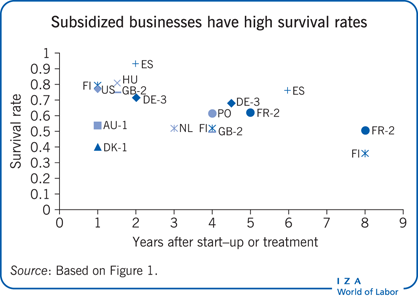Elevator pitch
Turning unemployment into self-employment is a suitable alternative to traditional active labor market policies in many developed countries. Start-up subsidies can assist unemployed workers in setting up their own business. This option can be especially interesting for people whose work is undervalued in paid employment or in situations where job offers are limited because of group-specific labor market constraints or structural changes. Furthermore, start-up subsidies are potentially associated with a “double dividend” if the subsidized businesses prosper, strengthen the economy, and create additional jobs in the future.

Key findings
Pros
Subsidized start-ups have high survival rates.
Subsidized start-ups may have large positive employment effects for participants and modest effects on income.
The positive effects of subsidized start-ups may be even higher for disadvantaged groups, such as women, youth, and low-educated workers.
Subsidized start-ups can induce some additional job creation.
Potential deadweight effects (if the same outcome could be achieved without the subsidy) are probably smaller than feared.
Cons
Subsidized start-ups lag behind regular start-ups in business growth and employment creation.
Subsidized start-ups are less innovative than regular start-ups.
By crowding out other, more efficient businesses, subsidized start-ups may have displacement effects, which can be hard to evaluate.
Subsidized start-ups require more commitment from participants in order to be fully successful.
Additional non-monetary support, such as coaching and mentoring, is required for subsidized start-ups in many circumstances.